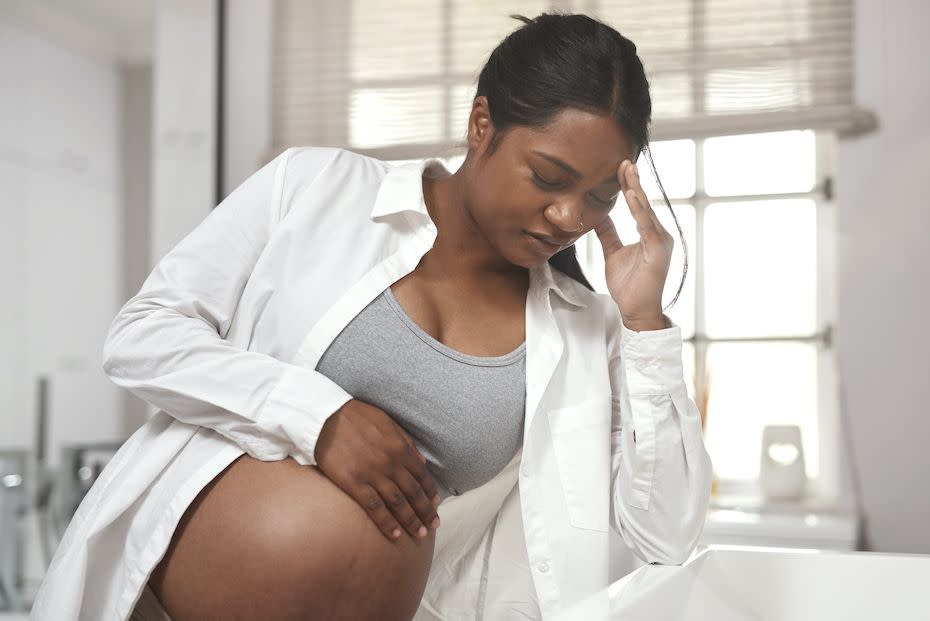Bleeding during pregnancy? We spoke to an expert to find out if it's normal
Pregnancy can be a strange time, whether it's your first child or not. With daily changes going on in the body, hormones flying about all over the place, pregnancy cravings running wild and anticipation about the safe arrival of the baby, it can trigger anxiety in even the calmest of people.
Missing a period is one of the most common indicators of being pregnant, so unexpected bleeding during pregnancy can cause understandable concern. But according to Anna Druet, a Scientific Reasearcher at period and ovulation tracking app Clue, there are a number of reasons why light bleeding can happen – especially in early pregnancy. And it doesn't always mean there's a problem.
Druet explains that "spotting and light bleeding are common symptoms of early pregnancy," although it's not actually a period. In rare cases, she says, "early trimester bleeding can be mistaken for menstruation, which can throw off the time estimates for the pregnancy by a month or more."
Why am I lightly bleeding during pregnancy?
Generally, light bleeding shouldn't be too much of an issue (although you should always get it checked out if you're concerned). It could be down to one of the following:
Implantation bleeding
While many sources call early spotting “implantation spotting”, early research is showing that early spotting in pregnancy may be more likely related to hormonal changes. Spotting may happen as the production of progesterone switches from the ovary to the forming placenta.
Sex
When you're pregnant, blood flow to the cervix increases. Because of this, sex during pregnancy may irritate the lower cervix, causing light bleeding.
You’re at full term
Once you’ve reached full term in your pregnancy, spotting is also normal. It may be bright red, brown or blood streaked mucous. It might happen spontaneously, or after sex. This could be your mucus plug. As long as it is mild and doesn’t continue or get worse, a bit of bleeding when you’re term is perfectly fine. Often it means you are going into labour as the cervix sometimes bleeds a bit as it opens up.

Why am I bleeding heavily during pregnancy?
If you're bleeding heavier, it's best to seek medical help as soon as you can. Heavy bleeding during pregnancy could be caused by either of the following:
Ectopic pregnancy
This is where the fertilised egg implants elsewhere (usually the fallopian tube instead of in the uterus) and is often accompanied by abdominal or shoulder pain or an urge to have a bowel movement. An ectopic pregnancy, which only occurs in two percent of pregnancies, should be treated as an emergency and can be diagnosed by a medical professional.
Miscarriage
Miscarriage occurs in roughly 1 in 5 detected pregnancies, and is, overall, a normal part of reproductive function. The miscarriage rate is closer to 1 in 3 when accounting for undetected pregnancies (sometimes women who don't know they're pregnant will experience an irregular bleed which they may put down to menstruation, but it could in actual fact be a miscarriage).
A miscarriage is not caused by the actions, behaviours or even the body of the pregnant person in the majority of cases – the most common reason is chromosomal issues in the fertilised egg.
Overall, Druet explains that "it is unlikely for regular bleeding to occur throughout the entire duration of the pregnancy, however it is not impossible." She also adds that "if bleeding at any time throughout the pregnancy is accompanied by cramping or abdominal pain, you should seek medical advice."
This article is not intended to be a substitute for professional medical advice or diagnosis. Always seek the advice of your physician or other qualified health provider with any questions you may have regarding a medical condition.
You Might Also Like

